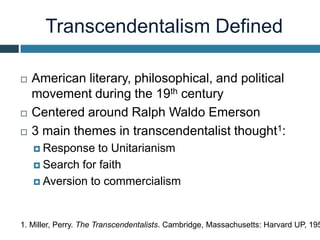Rhinehart emerson power point presentation
- 1. TRANSCENDENTALISM IN THE WORKS OF RALPH WALDO EMERSON Andrew Rhinehart ’é¤ English 1102
- 2. Transcendentalism Defined ’é© American literary, philosophical, and political movement during the 19th century ’é© Centered around Ralph Waldo Emerson ’é© 3 main themes in transcendentalist thought1: ’éż Response to Unitarianism ’éż Search for faith ’éż Aversion to commercialism 1. Miller, Perry. The Transcendentalists. Cambridge, Massachusetts: Harvard UP, 195
- 3. Ralph Waldo Emerson Biography ’é© Born in 1803 in Boston, Massachusetts ’é© Became a Unitarian pastor after graduating from the Harvard School of Divinity ’é© Death of his wife, Ellen Tucker, in 1831 exacerbated his crisis of faith ’é© Resigned from the clergy and traveled to Europe ’é© Strong advocate for the abolition of slavery
- 4. The Transcendentalist 1842 ’é© Contrasts materialists and idealists ’éż Materialists founded on experience ’ü« ŌĆ£data of the sensesŌĆØ ’éż Idealists founded on consciousness ’ü« ŌĆ£senses give us representations of things, but what are the things themselves, they cannot tellŌĆØ ’é© Outlines the main characteristics and beliefs of New England Transcendentalists
- 5. The Transcendentalist ’é© There is no pure Transcendentalist ’é© Solitude encourages alignment with nature ’é© ŌĆ£With this passion for what is great and extraordinary, it cannot be wondered at, that they are repelled by vulgarity and frivolity in people.ŌĆØ ’é© A materialist can be easily convinced of the magnitude of nature with simple questions about his environment
- 6. Self-Reliance 1841 ’é© Compilation of many different ideas from previous lectures and sermons ’é© Follows 3 major arguments: 1. Self-contained genius 2. Disapproval of the world 3. Value of self-worth ŌĆ£Trust thyselfŌĆØ
- 7. Self-Reliance ’é© Disdain for conformity ’é© ŌĆ£A foolish consistency in the hobgoblin of little minds, adored by little statesmen and philosophers and divines.ŌĆØ ’é© If one becomes a self-reliant individual, they can achieve their highest potential ’é© Critics of Emerson: ’éż This work is not a celebration of nature, but an example of our apprehension living within the world2 2. Boudreau, Kristin. "'The Woman's Flesh of Me': Rebecca Harding Davis's Response to Self-Reliance." American Transcendental Quarterly n.s 6.2 (June 1992)
- 8. Nature 1836 ’é© Foundation for all of EmersonŌĆÖs future development of American Transcendentalism ’é© Inspired by a trip to the Mus├®um National dŌĆÖHistoire Naturelle in Paris ’é© Fully explains his passion for nature and the problem with humanity ’éż Believes that we do not fully understand or accept the
- 9. Nature ŌĆ£ [Nature] arms and equips an animal to find its place and living in the earth, and, at the same time, she arms and equips another animal to destroy it.ŌĆØ ’é© Nature should be the jumping off point for all historical, theological, philosophical thought ’éż The Bible is not and cannot be an authority on our morality and humanity because it is only a secondhand account
- 10. Legacy of Emerson ’é© Fully developed American Transcendentalist characteristics and thought ’é© Influenced other major writers such as Walt Whitman and Henry David Thoreau ’é© Staunch abolitionist leaving an intellectual mark on anti- slavery writing ’é© Writings are considered major documents of American literature, philosophy, and religion still today









![Nature
ŌĆ£ [Nature] arms and equips an animal to find its
place and living in the earth, and, at the same
time, she arms and equips another animal to
destroy it.ŌĆØ
’é© Nature should be the jumping off point for all
historical, theological, philosophical thought
’éż The Bible is not and cannot be an authority on our
morality and humanity because it is only a
secondhand account](https://image.slidesharecdn.com/rhinehart-emersonpowerpointpresentation-140512202958-phpapp01/85/Rhinehart-emerson-power-point-presentation-9-320.jpg)
